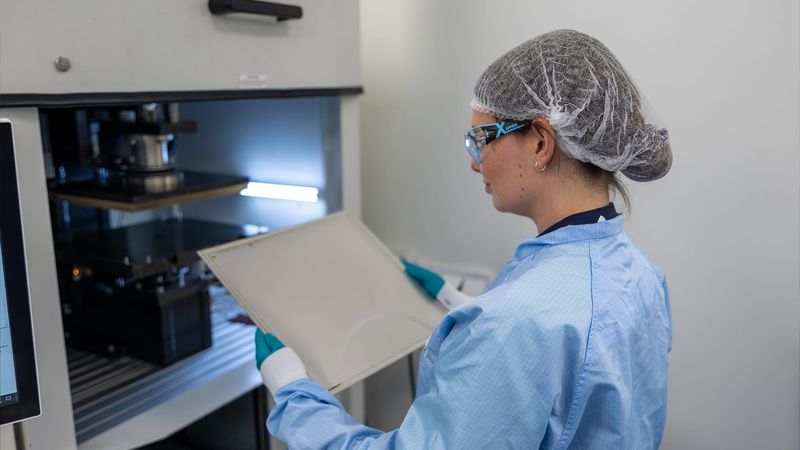Electroforming for Engineers: tailoring materials and properties to meet engineering demands
Electroforming is an Additive Manufacturing process specialized for the production of high-precision metal parts. Nickel, due to its expansive range of mechanical properties, aesthetic appeal, and resistance to corrosion, has become the most widely used material for this process. It not only enables the reproduction of extremely fine details but also permits the deposition of materials with high hardness. Electroforming technology allows depositing metal alloys to tailor specific material properties like mechanical or thermal characteristics.
Veco, as the world's leading specialist in Electroforming, offers high-precision Electroforming with Nickel, in a variety of unique blends or alloys suitable for particular engineering demands, such as Veco84 Nickel, Sulfamate Nickel, Palladium-Nickel (alloy), HR-Nickel, and Meta-Nickel.
Below, you'll find detailed information about these nickel variants. Each of these materials brings unique properties and advantages.
Veco84 Nickel is a uniquely engineered material designed to exhibit superior hardness and strength. Its hardness typically falls within the 620 to 660 HV range, making it a mechanically robust material. With its smooth, glossy finish, it offers both functional strength and aesthetic appeal. In addition to hardness, Veco84 boasts superior tensile and yield strength relative to other Electroformed materials. Its tensile strength can extend up to 2200-2300 MPa, while its yield strength can vary from 1900 to 2100 MPa. However, for applications necessitating high-temperature resilience or superior corrosion resistance, other types of nickel might be more suitable.
Sulfamate Nickel, while having a lower hardness of 185-200 HV compared to other nickel variants, presents a unique set of strengths. Its high ductility and low internal stresses grant it greater flexibility, enabling bending and shaping without resulting in cracks. This nickel variant also surpasses Veco’s other nickel types in terms of chemical and corrosion resistance, making it an optimal choice for applications necessitating high-temperature resilience and industries such as aerospace, electrical, and general engineering that require ductile components. Furthermore, the ductility of Sulfamate Nickel can be increased through annealing, although this process does lead to a softer material with correspondingly reduced strength. In addition, Sulfamate Nickel is deposited with low stress and outstanding uniformity, resulting in high-quality, reliable, and durable parts.
PdNi is a robust Electroformed Palladium-Nickel alloy with superior corrosion and chemical resistance. This allows it to better withstand acids, chloride environments, and other harsh media. Importantly, it also exhibits bio-compatibility, which is important for certain applications such as medical products in direct contact with the human body. In terms of mechanical properties, PdNi offers a high hardness of up to 530 HV, a tensile strength of 1750-1950, and a yield strength of 1700-1750. The carefully balanced composition of Palladium and Nickel yields an ideal amalgamation of corrosion resistance, mechanical strength, and functional properties. Thanks to this unique combination of properties, PdNi finds utility in an array of applications, from chemical processing equipment to components in the telecommunications industry.
HR-Nickel is a unique form of nickel developed by Veco that can withstand high temperatures without significant degradation or failure. During the plating process of HR-Nickel, proprietary additives are employed, bypassing the use of traditional organic hardeners which often undermine the thermal stability of nickel. In terms of mechanical properties, HR-Nickel has a hardness of approximately 470 HV. It exhibits a tensile strength of about 1680 MPa, while its yield strength lies in the range of 1100-1300 MPa. This combination of properties makes HR-Nickel a durable and reliable choice for applications exposed to high thermal conditions.
Meta-Nickel is a nickel blend with a hardness of up to 340 HV. This material is particularly suitable for laser-cutting and laser-welding processes, making it an optimal choice for multi-technology solutions. In terms of mechanical properties, Meta-Nickel exhibits a tensile strength of approximately 1070 MPa and a yield strength of around 780 MPa. In addition, Meta-Nickel can withstand operating temperatures up to 200°C without compromising its strength and ductility. This makes it a versatile material for various applications requiring both thermal resilience and mechanical robustness.
For a comprehensive comparison of all nickel types with standard SS316L or SS304, learn more about our material introductions here, you can also find detailed information to help guide your material selection process.
Interested in talking to an engineer instead? We're more than happy to assist. Our team of experienced engineers is available to answer your questions, provide expert advice, and guide you through your design and engineering process.
